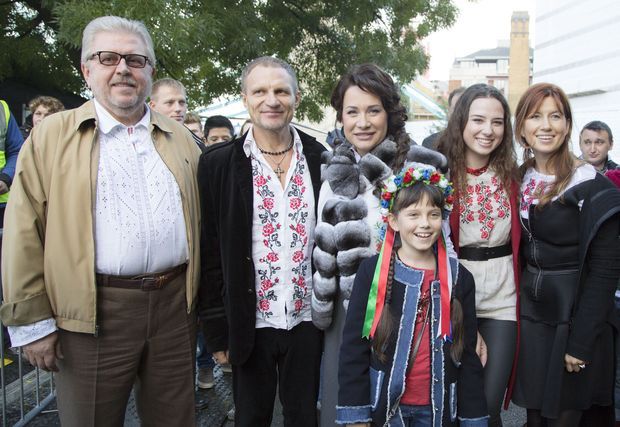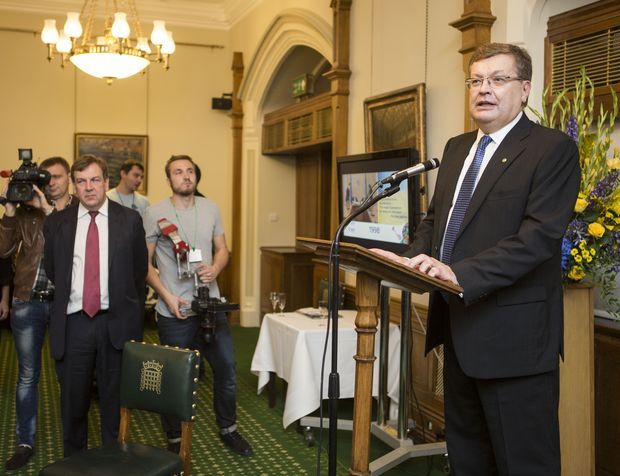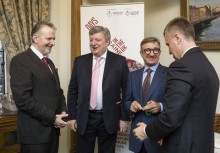The Days of Ukraine in the United Kingdom, organized by Firtash Foundation, have come to a close. At first, there were a lot of conflicting opinions about this project – some regarded it as nothing but a publicity stunt of a Ukrainian business group. But… As the Vilnius Summit, which is supposed to support the aspiration of Ukraine to integrate into Europe, is coming up, we must broaden the circle of Ukraine’s friends in the European alliance. This kind of people can be found in the UK, too, as can those who still remain in two minds.
“If I participated in the Vilnius Summit, I would vote for signing the Association Agreement with Ukraine. For it is the first step for Ukraine to become part of our, European, family,” Lord RISBY, Chairman of the British Ukrainian Society, says in answer to The Day’s question.
Yet it would be wrong to believe that his stand mirrors the sentiments of the vast majority of Britons. The reasons are as follows.
According to Zenko LASTOWIECKI, Chair of the Association of Ukrainians in Great Britain, Ukraine is always in the highlight of the British press, but most publications are on the political situation. “Something comes up once a week in one newspaper or another. They display interest but are still unable to understand us the way they should,” he says to The Day. In his words, Ukraine’s aspiration to integrate into Europe is acceptable at the political level, but, on the whole, Britons do not focus much on the Ukrainian question. “Therefore, to receive support from the majority of Britons in the Europe integration issue, Ukraine should make a greater effort to popularize herself abroad,” he says.
Besides, certain circles regard us as part of the Soviet past. “There still is a myth in Britain that Ukraine is part of Russia. And we want to debunk it because Ukraine has a rich and diverse culture and history of her own,” Rory FINNIN, director of the Cambridge Ukrainian Studies program, told The Day.
Ukrainian business, which is coming out on London’s expanses, also feels shortage of positive news about Ukraine. “The last major occasion for the British media to focus on Ukraine was the Orange Revolution. I can remember this very well, for our company was then playing at the stock exchange, everybody kept their fingers on the pulse and waited for the outcome of political face-offs. It was clear in the final analysis that we are a civilized country that knows how to resolve political disputes by democratic methods. Then came a certain information void. So now, with the EU Association Agreement to be signed shortly, the Days of Ukraine in the United Kingdom is one more chance for Ukraine to assert herself as a self-sufficient subject in the European space,” Serhii YEVLANCHIK, president of the Ukrprodukt company, told The Day.

THE DAYS OF UKRAINE IN THE UK ENDED WITH AN ETHNO-FAIR AND A GALA CONCERT IN LONDON’S POTTERS FIELDS PARK ON THE BANK OF THE THAMES NEAR THE FAMOUS TOWER BRIDGE. GUESTS MINGLED WITH (LEFT TO RIGHT) VOLODYMYR KHANDOHIY, AMBASSADOR OF UKRAINE TO THE UK; OLEH SKRYPKA, SINGER AND FRONTMAN OF THE BAND VV; AND LADA FIRTASH, THE FEST’S HOSTESS
It is very important for Ukraine to fight for Britain’s vote, for there is an “old” and a “new” Europe. While we have our lobbyists in the “new” Europe, the “old” one (to which the UK belongs) still fails to fully understand us. This failure is manifested in various forms. For example, on the eve of Euro-2012 the world-famous BBC aired a program that showed Ukrainian nationalists and soccer fans as almost fascists. Luckily, the company apologized to Ukraine for this later. But the “aftertaste” still remains and this negative information has left its imprint on the minds of many Britons.
The British business elite also want to know more about Ukraine’s investment climate. “Today, Britain knows about Ukraine, first of all, in connection with its political situation: this has been front-page news in the past few years. On the whole, though, Ukraine as such is not much known in London. This is why investors show no interest in her. We must do something about this,” says Kyrylo MOHYLNYK, a financial expert at the company Greenhill which specializes in merger and takeover consultations for major investors. In his words, the state should take steps in this direction as soon as possible, for Ukraine is by no means among the most successful candidates for receiving the money of investors. Yet, potentially, British investors are interested in Ukrainian farming, pharmaceutical companies, and consumer goods facilities. “I must say that London had evinced interest in Ukrainian business before 2008, but this interest declined after the crisis. In other words, everybody is taking interest but nobody is prepared to buy,” he adds. Why? Firstly, he says, there are very few public Ukrainian companies. Secondly, these companies are not too active at stock exchanges. “To realize their investment potential, they do not necessarily need to come out on the London site – it is sufficient to be present at other stock exchanges with, say, bonds. Public placement is a signal to investors that the company is alive and kicking,” he explains. Besides, the expert adds, it is important to hold such promotion events as these Days and always promote Ukraine’s investment capabilities in the world.
“At present, Europe still knows very little about Ukraine. This means we should actively work to bring closer the two countries’ people and cultures and organize social and cultural events,” says Lada FIRTASH, chair of the fest’s organizing committee and president of Firtash Foundation, explaining the reason why the Days of Ukraine were held. So, in her view, this London project will be the beginning of systemic work to improve Ukraine’s reputation abroad. “This event will intensify the cultural dialogue between the two countries and prompt the British to know more about a country that so far remains, in many respects, a blank spot on Europe’s map,” the fest’s hostess concludes.

UKRAINE’S VICE-PREMIER KOSTIANTYN HRYSHCHENKO TOLD THE DAY THAT THERE IS A TENDENCY IN THE BEHAVIOR OF UKRAINIAN BIG BUSINESS – IT BEGINS TO BE AWARE OF ITS ROLE IN PROJECTING A POSITIVE IMAGE OF UKRAINE ON THE INTERNATIONAL ARENA
Naturally, we could take a sterner and more fault-finding look at Ukraine’s first appearance on the London site and say what went wrong and ask where practical result is. But, on the other hand, it would be wrong to expect a speedy result from this event. It is very difficult to debunk myths and stereotypes, especially if there are so many of those who want them to be perpetuated. Still, there are some positive gains.
For example, selecting Ukrainian artists’ works to be shown at London’s Saatchi Gallery, Sotheby’s antiquary house experts spotted a talented sculptor, Nazar Bilyk, and are negotiating an exhibit of his works at their auctions. “Sotheby’s is planning to hold an auction, ‘Eastern Europe: Contemporary Art,’ on November 24 or 26, in which 10-12 Ukrainian artists will take part (Tistol, Savadov, Kryvolap, Makov, Zhyvotkov, et al),” says the Saatchi exhibition curator Ihor ABRAMOVYCH. He hopes that the presentation in one of Europe’s five largest noncommercial art sites will provide Ukrainian artists with European curators and simplify their participation in international projects.
London also noticed and praised Ukrainian fashion for the simplicity of forms and multiplicity of colors. “The one who especially caught our eyes was Zinaida Likhachova who tried to display a stereotype-free Ukrainian woman and reveal her national essence, stressing her beauty. On the whole, the works presented at the fashion show emphasize femininity: a lot of decorations, flat shoes without heelpieces… Ukrainian designers convey the same message to their audiences as we do to our own,” the British Fashion Council’s strategy advisor Anna ORSINI said in a brief interview with The Day. In her words, London is inviting new talents from various countries to take part in the international Fashion Week in February. “We are making a selection for 2014 and working with the Ukrainian Embassy in the UK. This will be a fashion show or, rather, exhibition, and my job is to find designers (including Ukrainians) who will take part in an international exhibition as part of the February, 2014, Fashion Week in London. As I have already said, I liked the works of Pustovit and Litkovska, as well as a performance from Zinaida Likhachova, but I’d like to see more,” she says in conclusion.
What next? This question remains open. The organizers are not going to stop and promise even more interesting things next year. According to Group DF president Dmytro FIRTASH, they hit upon the following idea after talking with London Stock Exchange managers: the next Days of Ukraine should include a day for businesspeople and investors so that they could have a look at and communicate with each other. “Britain is one of the world’s main financial and cultural hubs. So the more we display ourselves and our capabilities here, the better our country’s investment image will be,” he told The Day. The businessman says that a successful appearance on the London site will allow national business to receive cheaper loans and help solve social problems in conjunction with the state.
On the whole, the three-day cultural promotion of Ukraine in the UK drew the attention of a considerable number of people – about 110-120 thousand guests visited the events. All that united them was interest in Ukraine. We must only hope now that this interest will result in a positive attitude of Britons to us. For, moving towards Europe, Ukraine is searching, as a novice businessman would, for a reliable partner to launch a business. But, before starting a successful enterprise, partners ought to come to know about one another – who they are, what values they cherish, and what roots they have. To learn to speak in the same language with Europe in general and each of its countries in particular is also a challenge for business which has at last become aware of its role as Ukraine’s investment and culture lobbyist on the international arena.







